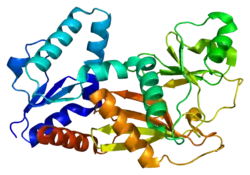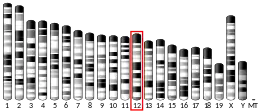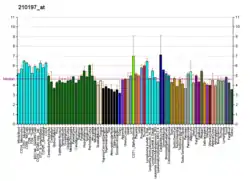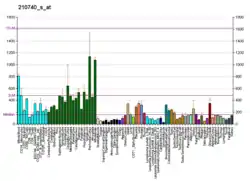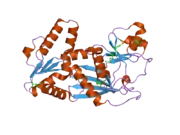ITPK1
Inositol-tetrakisphosphate 1-kinase is an enzyme that in humans is encoded by the ITPK1 gene.[5][6][7]
It is involved in inositol signalling pathways which regulate the conductance of calcium-activated chloride channels, and therefore could be relevant in the study of cystic fibrosis.[8][9]
References
- ENSG00000274958 GRCh38: Ensembl release 89: ENSG00000100605, ENSG00000274958 - Ensembl, May 2017
- GRCm38: Ensembl release 89: ENSMUSG00000057963 - Ensembl, May 2017
- "Human PubMed Reference:". National Center for Biotechnology Information, U.S. National Library of Medicine.
- "Mouse PubMed Reference:". National Center for Biotechnology Information, U.S. National Library of Medicine.
- Wilson MP, Majerus PW (Aug 1996). "Isolation of inositol 1,3,4-trisphosphate 5/6-kinase, cDNA cloning and expression of the recombinant enzyme". J Biol Chem. 271 (20): 11904–10. doi:10.1074/jbc.271.20.11904. PMID 8662638.
- Yang X, Shears SB (Jan 2001). "Multitasking in signal transduction by a promiscuous human Ins(3,4,5,6)P(4) 1-kinase/Ins(1,3,4)P(3) 5/6-kinase". Biochem J. 351 (3): 551–5. doi:10.1042/0264-6021:3510551. PMC 1221393. PMID 11042108.
- "Entrez Gene: ITPK1 inositol 1,3,4-triphosphate 5/6 kinase".
- Saiardi A, Cockcroft S (2008). "Human ITPK1: a reversible inositol phosphate kinase/phosphatase that links receptor-dependent phospholipase C to Ca2+-activated chloride channels". Sci Signal. 1 (4): pe5. doi:10.1126/stke.14pe5. PMID 18272466. S2CID 36710246.
- Chamberlain PP, Qian X, Stiles AR, Cho J, Jones DH, Lesley SA, Grabau EA, Shears SB, Spraggon G (September 2007). "Integration of inositol phosphate signaling pathways via human ITPK1". J. Biol. Chem. 282 (38): 28117–25. doi:10.1074/jbc.M703121200. PMC 2244811. PMID 17616525.
Further reading
- Wilson MP, Sun Y, Cao L, Majerus PW (2001). "Inositol 1,3,4-trisphosphate 5/6-kinase is a protein kinase that phosphorylates the transcription factors c-Jun and ATF-2". J. Biol. Chem. 276 (44): 40998–1004. doi:10.1074/jbc.M106605200. PMID 11533064.
- Ho MW, Yang X, Carew MA, et al. (2002). "Regulation of Ins(3,4,5,6)P(4) signaling by a reversible kinase/phosphatase". Curr. Biol. 12 (6): 477–82. doi:10.1016/S0960-9822(02)00713-3. PMID 11909533.
- Sun Y, Wilson MP, Majerus PW (2003). "Inositol 1,3,4-trisphosphate 5/6-kinase associates with the COP9 signalosome by binding to CSN1". J. Biol. Chem. 277 (48): 45759–64. doi:10.1074/jbc.M208709200. PMID 12324474.
- Strausberg RL, Feingold EA, Grouse LH, et al. (2003). "Generation and initial analysis of more than 15,000 full-length human and mouse cDNA sequences". Proc. Natl. Acad. Sci. U.S.A. 99 (26): 16899–903. Bibcode:2002PNAS...9916899M. doi:10.1073/pnas.242603899. PMC 139241. PMID 12477932.
- Sun Y, Mochizuki Y, Majerus PW (2003). "Inositol 1,3,4-trisphosphate 5/6-kinase inhibits tumor necrosis factor-induced apoptosis". J. Biol. Chem. 278 (44): 43645–53. doi:10.1074/jbc.M300674200. PMID 12925536.
- Gerhard DS, Wagner L, Feingold EA, et al. (2004). "The status, quality, and expansion of the NIH full-length cDNA project: the Mammalian Gene Collection (MGC)". Genome Res. 14 (10B): 2121–7. doi:10.1101/gr.2596504. PMC 528928. PMID 15489334.
- Qian X, Mitchell J, Wei SJ, et al. (2005). "The Ins(1,3,4)P3 5/6-kinase/Ins(3,4,5,6)P4 1-kinase is not a protein kinase". Biochem. J. 389 (Pt 2): 389–95. doi:10.1042/BJ20050297. PMC 1175116. PMID 15762844.
- Miller GJ, Wilson MP, Majerus PW, Hurley JH (2005). "Specificity determinants in inositol polyphosphate synthesis: crystal structure of inositol 1,3,4-trisphosphate 5/6-kinase". Mol. Cell. 18 (2): 201–12. doi:10.1016/j.molcel.2005.03.016. PMID 15837423.
- Rual JF, Venkatesan K, Hao T, et al. (2005). "Towards a proteome-scale map of the human protein-protein interaction network". Nature. 437 (7062): 1173–8. Bibcode:2005Natur.437.1173R. doi:10.1038/nature04209. PMID 16189514. S2CID 4427026.
This article is issued from Wikipedia. The text is licensed under Creative Commons - Attribution - Sharealike. Additional terms may apply for the media files.
